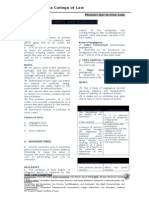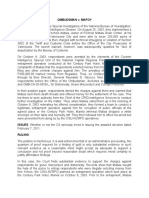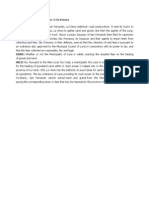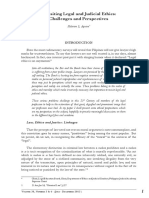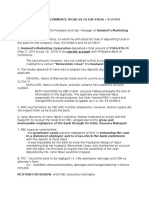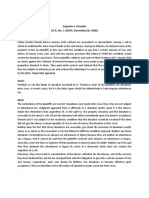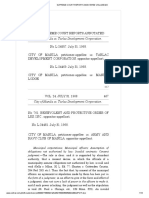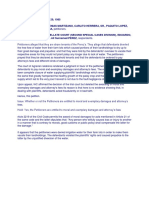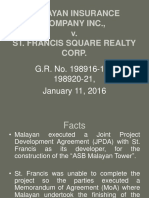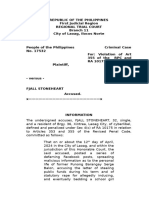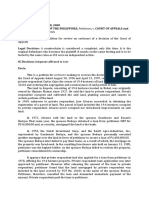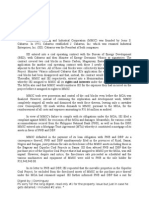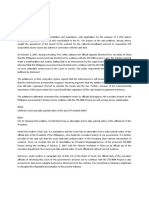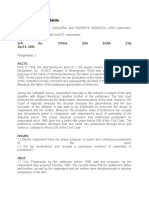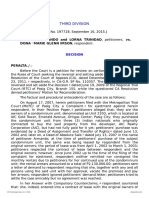Puig vs. Penaflorida (Revocation)
Puig vs. Penaflorida (Revocation)
Uploaded by
Bam BathanCopyright:
Available Formats
Puig vs. Penaflorida (Revocation)
Puig vs. Penaflorida (Revocation)
Uploaded by
Bam BathanOriginal Description:
Original Title
Copyright
Available Formats
Share this document
Did you find this document useful?
Is this content inappropriate?
Copyright:
Available Formats
Puig vs. Penaflorida (Revocation)
Puig vs. Penaflorida (Revocation)
Uploaded by
Bam BathanCopyright:
Available Formats
PUIG VS.
PENAFLORIDA (revocation)
Issue:
1. Are the 2 donations inter vivos or mortis causa? Are these donations revocable?
2. Was the donation of a portion of Lot 2053 covered by TCT 927 validated by par. 10 of the last will and testament of the
decedent?
Rules:
Bonsato vs. Court of Appeals. 95 Phil. 481
The Spanish Civil Code of 1889 (Art. 620) as well as the Civil Code of the Philippines (Art. 728), admit only gratuitous
transfers of title or real rights to property either by way of donation inter vivos or else by way of last will and testament,
executed with the requisite legal formalities. In the first case, the act is immediately operative, even if the actual execution
may be deferred until the death of the donor; in the second, nothing is conveyed to the grantee and nothing is acquired
by the latter, until the death of the grantor-testator, the disposition being until then ambulatory and not final.
Bautista vs. Sabiniano, 92 Phil. 244; Bonsato vs. Court of Appeals, supra
In dispositions mortis causa conveyance or alienation is revocable ad nutum, i.e., at the discretion of the grantor or so-
called "donor" simply because the latter has changed his mind.
Zapanta vs.Posadas, 52 Phil. 557
The specification in the deed of donation of the causes whereby the act may be revoked by the donor indicates that the
donation is inter vivos, rather than a disposition mortis causa.
Laureta vs. Mata, 44 Phil. 668; Concepcion vs. Concepcion, L-4225, August 25, 1952; Cuevas us, Cuevas, 68
Phil. 68
The designation of the donation as mortis causa, or a provision in the deed to the effect that the donation is "to take
effect at the death of the donor" are not controlling criteria; such statements are to be construed together with the rest of
the instrument, in order to give effect to the real intent of the transferor (Concepcion vs. Concepcion, supra; Bonsato
vs. Court of Appeals, supra)
Carlos vs. Ramil, 20 Phil. 183; Manalo vs. De Mesa, 29 Phil. 495
A conveyance for onerous consideration is governed by the rules of contracts and not by those of donation or Testament.
Art. 1256, Civ. Code of 1889; Art. 1308, Civil Code of the Philippines
The effectivity, compliance, or binding effect of contracts cannot be left to the sole will of one of the parties.
Analysis:
Carmen died without forced heirs. She was survived by her nephews and nieces. Carmen left a will and executed 2
notarial deeds of donation both in favor of her niece, Estela married to Mariano. One is entitled DONATION MORTIS CAUSA
which was executed on November 24, 2948 conveying 2 parcels of land. Some of the provisions of the deed are as follows:
1. Donor reserves the right to mortgage and even sell the properties subject of the deed of donation when and if she should need
funds to meet her own needs.
2. Donee shall cover expenses for medical treatment and hospital expenses and/or burial of the donor unless the Donor has own
funds. In which case said resources shall cover the expenses.
3. The transfer will take effect when the donor dies.
4. If the Donee dies before the donor, the donation will take effect in favor of the children. Don Mariano Penaflorida, the current
governor of Iloilo, shall assume the obligations of the Donee in this donation.
5. The Donee shall meet the expenses of the last illness of the Donor and bury the latter.
6. This deed of gift will be presented to the Register of Titles after the Donors death.
On December 28, 1949, Carmen executed another deed of donation entitled ESCRITURA DE DONACION MORTIS CAUSA.
She ceded and transferred to the done in the concept of donation mortis causa the following:
1. Whole of Lot No. 2054 covered by TCT No. 926
2. The totality of the secana and high portion of it that is not dedicated to sowing and cultivation of palay of Lot. No. 2053 covered by
TCT No. 927
3. Half of Lot No. 58 under the following conditions:
a. If on the date of his death and there is no donor after past sold or transferred to other third parties or entities, half of said
Lot No. 58, the Donee is committed and forced to pay Caridad Ubalde P600 and the payment of this amount will be verified
on the date when the Donee takes possession of half of said Lot No. 58
b. Before his death, the Donor could alienate, sell, transfer or mortgage to any persons or entities the goods donated in favor
of the Donee in the concept of donation mortis causa
c. This writing of donation mortis causa will not be registered in the office of the Registrar of Titles but after the death of the
Donor.
Both donations were recorded in the corresponding registry of deeds after Carmens death. The will executed by Carmen on March
26,1957 was submitted by her cousins, petitioners in this case (Angeles Puig) to the CFI. The provisions of which are the ff:
I leave to Doa Angeles Ubalde, married to Don Francisco Puig, all the palayera portion of Lot. 2053 covered by TCT No. 927 issued
in my favor by the Register of Titles.
In relation with the lot donation, I have yielded and transferred in the concept of a donation mortis causa to Doa Estela Magbanua
married to Don Mariano Penaflorida the high and dry portion of the same lot that is not dedicated to cultivation and sowing of palay.
The petitioners are seeking the have the 2 deed of donations be set aside for lack of formalities.
The CFI ruled adversely to Estela holding that the 2 deeds of donation were invalid and have no effect for lack of testamentary
formalities.
Conclusion Issue #1:
The November 1948 donation should be held inter vivos even if it is designated as mortis causa.
In the case of Manalo vs. De Mesa, a conveyance for onerous consideration is governed by the rules of contracts and
not by those of donation or testament. To apply this in the present case, the conveyance has an onerous character when it
required the Donee to cover expenses for medical treatment and hospital expenses and/or burial of the donor unless the Donor
has own funds and when it required Mariano Penaflorida to assume the obligations of Estela in case she will die prior to Carmen.
This undertaking was assumed even if the properties donated would not go to him but to the children and descendants of Estela.
The obligations assumed by the donee and her husband would be without consideration. Having said that, it is governed by the
rules of contracts and it is valid although it is not recorded in a public instrument.
With regard to revocation, the donor has the freedom to revoke at any time the donation mortis causa. However when
Carmen stipulated in the deed that she reserves her right to mortgage or even sell the donated property when and if she
should need funds to meet her own needs, this stipulation became in conflict with her freedom to revoke a true
conveyance mortis causa. She could not simply mortgage or even sell her property for any other purpose and if it is shown that
she has funds to meet her needs.
The December 28, 1949 donation is a donation mortis causa. No proprietary right was intended to pass to Estela prior to
the death of Carmen.
Unlike in the previous donation, the designation as donation mortis causa is confirmed by the fact that no signs
contradict or limit the unqualified and unrestricted right of the donor to alienate the conveyed properties in favor of other
persons of her choice at any time that she should wish to do so;
Carmen did not wish to be bound nor did she want to lose her title over the property during her lifetime. There is no
donation inter vivos since none was intended and there is no donation mortis causa because the acts are intended to be
effective only after the death of the grantor and must be executed in the form of a last will and testament or else it will not
be legally valid. (donation mortis causa ang Dec 1949 donation pero there is no donation mortis causa kasi may absence ng legal formalities)
Conclusion Issue #2
As to the conveyance of Lot 2053, whether it was validated by Par. 10 of Carmens last will and testament, the declaration that
Carmen had conveyed said portion of the lot to Estela by donation mortis causa, validates the conveyance of Lot 2053. This portion
of the will is valid as an independent testamentary legacy.
You might also like
- Letter of Intent To Buy Real PropertyDocument2 pagesLetter of Intent To Buy Real PropertyAnonymous 2FpdQGKE93% (15)
- Contract To Sell SampleDocument9 pagesContract To Sell SampleJasmin Regis Sy80% (5)
- LEGAL AUDIT FormatDocument5 pagesLEGAL AUDIT FormatPriya Kalra100% (1)
- Civil Law Reviewer 2022 (Revised)Document23 pagesCivil Law Reviewer 2022 (Revised)Bam Bathan75% (4)
- HEIRS OF BACUS VS. CA - Docx JAJAJDocument6 pagesHEIRS OF BACUS VS. CA - Docx JAJAJSherwin Anoba CabutijaNo ratings yet
- Worcester V OcampoDocument4 pagesWorcester V OcampoLibay Villamor Ismael100% (1)
- Torts and Damages Memory AidDocument29 pagesTorts and Damages Memory AidReynoldMabaitLayam100% (3)
- Torts Pineda QA UPDocument5 pagesTorts Pineda QA UPHeintje Nopra100% (1)
- City of Lapu-Lapu Vs PezaDocument3 pagesCity of Lapu-Lapu Vs PezaAerwin Abesamis100% (2)
- Only Gpa Sales and Such Transfers Are Banned by Supreme Court and Not Genuine and Legally Valid Gpa - An Article by Sridharababu.nDocument24 pagesOnly Gpa Sales and Such Transfers Are Banned by Supreme Court and Not Genuine and Legally Valid Gpa - An Article by Sridharababu.nSridhara babu. N - ಶ್ರೀಧರ ಬಾಬು. ಎನ್100% (2)
- Real - Property FlowchartDocument12 pagesReal - Property FlowchartHelim Kathleen Chun92% (13)
- 1 Puig vs. Penaflorida, 16 SCRA 136Document8 pages1 Puig vs. Penaflorida, 16 SCRA 136Francis Leo TianeroNo ratings yet
- Puig vs. PenafloridaDocument1 pagePuig vs. PenafloridaMonikkaNo ratings yet
- Angeles Ubalde Puig, Et Al. vs. Estella Magbanua Peñaflorida, Et Al. G.R. No. L-15939 January 31, 1966Document1 pageAngeles Ubalde Puig, Et Al. vs. Estella Magbanua Peñaflorida, Et Al. G.R. No. L-15939 January 31, 1966Joyjoy C LbanezNo ratings yet
- Monteverde V GenerosoDocument2 pagesMonteverde V GenerosoannlorenzoNo ratings yet
- OMBUDSMAN v. MAPOYDocument2 pagesOMBUDSMAN v. MAPOYSachieCasimiroNo ratings yet
- De Leon Brokerage V CADocument6 pagesDe Leon Brokerage V CACastle CastellanoNo ratings yet
- Cainta vs. Pasig & Uniwide SalesDocument10 pagesCainta vs. Pasig & Uniwide SalesmarjNo ratings yet
- LBC AIR CARGO Vs CADocument2 pagesLBC AIR CARGO Vs CANhassie John GONZAGA100% (1)
- Hidalgo V Balandan - Bona (Attractive Nuissance)Document1 pageHidalgo V Balandan - Bona (Attractive Nuissance)Claire Margarette M. Bona100% (1)
- 1 Lizarraga Hermanos V AbadaDocument1 page1 Lizarraga Hermanos V AbadaElaizza ConcepcionNo ratings yet
- Torres JR v. LapinidDocument2 pagesTorres JR v. LapinidEPZ RELA100% (2)
- 01 Philippine Trust Co V Tan SuisaDocument1 page01 Philippine Trust Co V Tan SuisaArtemisTzyNo ratings yet
- Mun of San Fernando Vs Sta RomanaDocument1 pageMun of San Fernando Vs Sta RomanaKara AgliboNo ratings yet
- 10 Greenhills East Association v. GanzonDocument3 pages10 Greenhills East Association v. GanzonAizaLizaNo ratings yet
- Revisiting Legal and Judicial Ethics, Challenges and PerspectivesDocument10 pagesRevisiting Legal and Judicial Ethics, Challenges and PerspectivesninoNo ratings yet
- Municipality of Paoay Vs ManaoisDocument3 pagesMunicipality of Paoay Vs ManaoisRaymond RoqueNo ratings yet
- HIDDEN Treasure CaseDocument6 pagesHIDDEN Treasure CaseGe LatoNo ratings yet
- Medelo v. Gorospe Exemplary DamagesDocument3 pagesMedelo v. Gorospe Exemplary DamagesIrish GarciaNo ratings yet
- PBC Vs CA and Rommel's Marketing Corp.Document3 pagesPBC Vs CA and Rommel's Marketing Corp.Felix Leonard NovicioNo ratings yet
- Bautista Vs Auto Plus TradersDocument1 pageBautista Vs Auto Plus TradersMary Joyce Lacambra AquinoNo ratings yet
- In The Matter of The Summary Settlement of The Estate of X Maria Dela Cruz PetitionerDocument3 pagesIn The Matter of The Summary Settlement of The Estate of X Maria Dela Cruz PetitionerDan LocsinNo ratings yet
- Zapanta Vs Posadas GR No L-29204-09Document1 pageZapanta Vs Posadas GR No L-29204-09Joyjoy C LbanezNo ratings yet
- City of Manila v. Tarlac Development CorpDocument14 pagesCity of Manila v. Tarlac Development CorpNOLLIE CALISINGNo ratings yet
- 32-40 CasesDocument40 pages32-40 CasesWilfredo Guerrero IIINo ratings yet
- Dingcong vs. Kanaan PDFDocument2 pagesDingcong vs. Kanaan PDFCharm Divina LascotaNo ratings yet
- de Leon Brokerage V CADocument3 pagesde Leon Brokerage V CABettina Rayos del SolNo ratings yet
- Santos Vs LumbaoDocument2 pagesSantos Vs LumbaoMacNo ratings yet
- Taylor V Manila Electric CoDocument3 pagesTaylor V Manila Electric CoAngela Louise Sabaoan67% (6)
- Heirs of Bugarin vs. Republic PDFDocument2 pagesHeirs of Bugarin vs. Republic PDFAnnaNo ratings yet
- GR No. 116123, March 13, 1997: Keywords and Rulings Torts and DamagesDocument4 pagesGR No. 116123, March 13, 1997: Keywords and Rulings Torts and DamagesTanya Sejane100% (1)
- Dingcong v. Kanaan (Torts Digest)Document2 pagesDingcong v. Kanaan (Torts Digest)Francisco Ashley AcedilloNo ratings yet
- Sample Information SlanderDocument2 pagesSample Information SlanderAshleyNo ratings yet
- Lipat vs. Pacific Banking CorporationDocument3 pagesLipat vs. Pacific Banking CorporationMonikka DeleraNo ratings yet
- CJ Yulo Vs RCB San PabloDocument2 pagesCJ Yulo Vs RCB San PabloRob BankyNo ratings yet
- Magbanua vs. IACDocument1 pageMagbanua vs. IACShy ShylaNo ratings yet
- Civil Law Bar Questions 06-14Document50 pagesCivil Law Bar Questions 06-14CarmeloNo ratings yet
- 4 - Penta Pacific Realty Corp Vs Ley Construction and Development CorpDocument3 pages4 - Penta Pacific Realty Corp Vs Ley Construction and Development Corpjag murilloNo ratings yet
- Lim Tanhu v. RamoleteDocument2 pagesLim Tanhu v. RamoleteMaria Lourdes DatorNo ratings yet
- Taxation Law - 2013 Dimaampao Lecture Notes PDFDocument90 pagesTaxation Law - 2013 Dimaampao Lecture Notes PDFPaul Joseph MercadoNo ratings yet
- People v. Kintanar CTADocument3 pagesPeople v. Kintanar CTAMark CapaciteNo ratings yet
- Quilala Vs Alcantara 371 SCRA 311Document2 pagesQuilala Vs Alcantara 371 SCRA 311Ellen Glae DaquipilNo ratings yet
- Malayan Insurance Company Inc., v. St. Francis Square Realty CorpDocument22 pagesMalayan Insurance Company Inc., v. St. Francis Square Realty CorpDavid Sim Christopher Tampus100% (1)
- Case DigestDocument3 pagesCase DigestFbarrs100% (1)
- Orix v. MangalinaoDocument2 pagesOrix v. Mangalinaomiles1280No ratings yet
- INFORMATION CYBERLIBELDocument3 pagesINFORMATION CYBERLIBELAna Marie Faith CorpuzNo ratings yet
- The Secretary of Education v. Heirs of Rufino DulayDocument2 pagesThe Secretary of Education v. Heirs of Rufino DulayiwamawiNo ratings yet
- Litonjua Vs LR CorporationDocument1 pageLitonjua Vs LR CorporationRed HaleNo ratings yet
- Sales Case Digest - Batch 8Document29 pagesSales Case Digest - Batch 8dazed_3250% (2)
- Ejercito Vs ComelecDocument7 pagesEjercito Vs ComelecTammy Yah100% (1)
- Digest Rule 6 No. 3 DBP v. CADocument3 pagesDigest Rule 6 No. 3 DBP v. CARomnick JesalvaNo ratings yet
- G.R. No. L-60413 RP vs. Jg. SAYODocument1 pageG.R. No. L-60413 RP vs. Jg. SAYORina TruNo ratings yet
- Evangelista vs. SistozaDocument1 pageEvangelista vs. SistozaZandra LeighNo ratings yet
- PNB V CaDocument3 pagesPNB V CaJeahMaureenDominguezNo ratings yet
- Bonsato v. CA 95 Phil. 481 FactsDocument7 pagesBonsato v. CA 95 Phil. 481 FactsNikko SterlingNo ratings yet
- Puig v. Penaflorida TranslatedDocument10 pagesPuig v. Penaflorida TranslatedAnonymous ZUivU2Yw94No ratings yet
- Ganuelas v. CawedDocument10 pagesGanuelas v. CawedFaustina del RosarioNo ratings yet
- Lejano vs. PeopleDocument234 pagesLejano vs. PeopleBam BathanNo ratings yet
- Judicial Notice When Mandatory - 4.Suplico-vs-NedaDocument1 pageJudicial Notice When Mandatory - 4.Suplico-vs-NedaBam Bathan100% (1)
- SPCMB Law Offices vs. CADocument90 pagesSPCMB Law Offices vs. CABam BathanNo ratings yet
- Intestate Succession CasesDocument23 pagesIntestate Succession CasesBam BathanNo ratings yet
- Mahilum vs. IlanoDocument25 pagesMahilum vs. IlanoBam BathanNo ratings yet
- Transfield Phils. vs. Luzon HydroDocument36 pagesTransfield Phils. vs. Luzon HydroBam BathanNo ratings yet
- Molina vs. MagatDocument8 pagesMolina vs. MagatBam BathanNo ratings yet
- HSY Vs VillastiqueDocument17 pagesHSY Vs VillastiqueBam BathanNo ratings yet
- DBP vs. Guarina AgriculturalDocument18 pagesDBP vs. Guarina AgriculturalBam BathanNo ratings yet
- Ting Trucking Vs Makilan PDFDocument16 pagesTing Trucking Vs Makilan PDFBam BathanNo ratings yet
- Cagungun vs. Planters Dev't BankDocument21 pagesCagungun vs. Planters Dev't BankBam BathanNo ratings yet
- Tabularized Habeas Corpus vs. AmparoDocument5 pagesTabularized Habeas Corpus vs. AmparoBam BathanNo ratings yet
- Palaganas vs. PalaganasDocument6 pagesPalaganas vs. PalaganasBam BathanNo ratings yet
- Rodriguez Vs SalvadorDocument3 pagesRodriguez Vs SalvadorBam BathanNo ratings yet
- Molina vs. MagatDocument8 pagesMolina vs. MagatBam BathanNo ratings yet
- Province of Bulacan vs. CA PDFDocument16 pagesProvince of Bulacan vs. CA PDFBam BathanNo ratings yet
- Sps. Santiago vs. VillamorDocument11 pagesSps. Santiago vs. VillamorBam BathanNo ratings yet
- Writ of Habeas CorpusDocument2 pagesWrit of Habeas CorpusBam Bathan100% (4)
- Land Bank of The Philippines vs. NatividadDocument2 pagesLand Bank of The Philippines vs. NatividadBam BathanNo ratings yet
- Real vs. Chattel MortgageDocument2 pagesReal vs. Chattel MortgageBam Bathan100% (1)
- Trust ActDocument67 pagesTrust ActPallavi UNo ratings yet
- Deed of Road Right of WayDocument6 pagesDeed of Road Right of WayPlaridel Madrigal75% (4)
- Gonzales v. Gonzales DigestDocument2 pagesGonzales v. Gonzales DigestkathrynmaydevezaNo ratings yet
- Government Service Insurance System v. CourtDocument7 pagesGovernment Service Insurance System v. CourtIvan TejadaNo ratings yet
- 214179-2018-Vive Eagle Land Inc. v. National HomeDocument5 pages214179-2018-Vive Eagle Land Inc. v. National HomewangruilunNo ratings yet
- Property Law Cases - Atty. SengaDocument140 pagesProperty Law Cases - Atty. SengaAgatha Faye CastillejoNo ratings yet
- Land Titles - End LecturesDocument72 pagesLand Titles - End LecturesLiz Zie100% (1)
- Acknowledgment of Reversion of Estate' and Fiduciary Request' Quit Claim Deed + Marriott Tampa WestshoreDocument3 pagesAcknowledgment of Reversion of Estate' and Fiduciary Request' Quit Claim Deed + Marriott Tampa Westshoreshasha ann bey100% (2)
- Land Titles Synthesis Finals PDFDocument19 pagesLand Titles Synthesis Finals PDFAl-Emir Yusoph BaltNo ratings yet
- Affidavit of AdjudicationDocument5 pagesAffidavit of AdjudicationRickyCheryll Bay AmparoNo ratings yet
- Partnership DeedDocument3 pagesPartnership DeedPavan Kumar k.No ratings yet
- Realistic Costs Should Be Imposed To Discourage Frivolous LitigationsDocument173 pagesRealistic Costs Should Be Imposed To Discourage Frivolous LitigationsLive LawNo ratings yet
- Law Books Pricelist (As of - 2010)Document10 pagesLaw Books Pricelist (As of - 2010)Shim Lei R. ClimacoNo ratings yet
- 3.13 Herrera v. LevisteDocument9 pages3.13 Herrera v. LevisteBeltran KathNo ratings yet
- Ballesteros Vs AbionDocument6 pagesBallesteros Vs AbionCheryl ChurlNo ratings yet
- Basic Types of Legal Documents: - Deeds, Wills, Mortgages, EtcDocument9 pagesBasic Types of Legal Documents: - Deeds, Wills, Mortgages, EtcvenkatNo ratings yet
- Aguila Vs CADocument6 pagesAguila Vs CAPatrick RamosNo ratings yet
- Cequena v. Bolante PDFDocument5 pagesCequena v. Bolante PDFerxha ladoNo ratings yet
- Absolute Sale DeedDocument6 pagesAbsolute Sale DeedAbhishek Charan100% (1)
- Contract To Buy and SellDocument4 pagesContract To Buy and SellBeulah Coeli Catingub FielNo ratings yet
- Aluad vs. Aluad (Ahmad vs. Ahmad in Syllabus)Document2 pagesAluad vs. Aluad (Ahmad vs. Ahmad in Syllabus)mononikkiNo ratings yet
- Velarde v. Court of AppealsDocument6 pagesVelarde v. Court of Appealscmv mendozaNo ratings yet
- 4 Spouses Trinidad v. ImsonDocument9 pages4 Spouses Trinidad v. ImsonCAJNo ratings yet
- Act No 1120 - Friar Lands ActDocument10 pagesAct No 1120 - Friar Lands ActrbNo ratings yet






